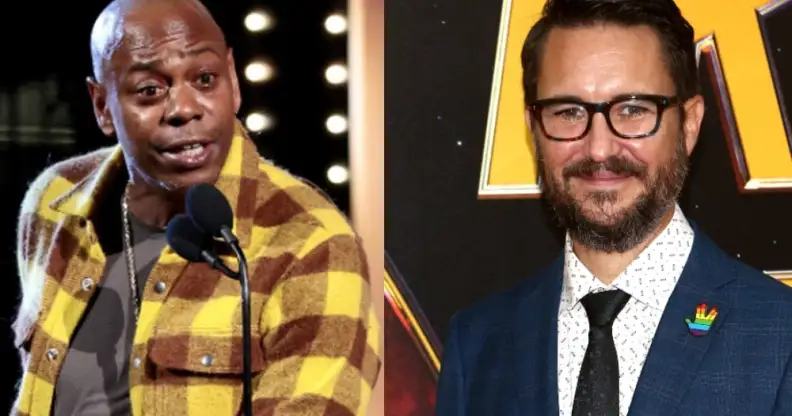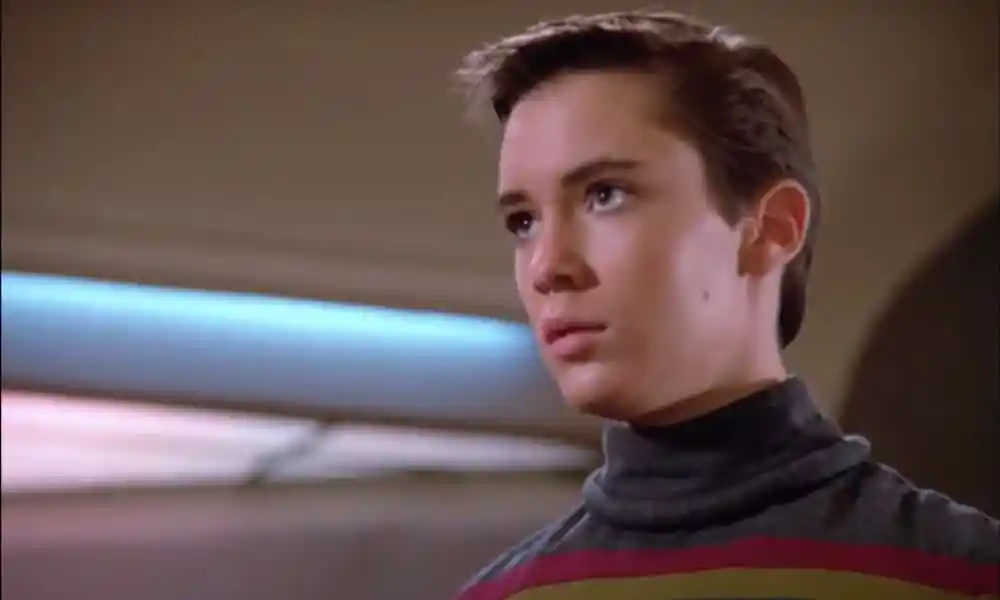Wil Wheaton apologises for past homophobia and explains how ‘comedy’ like Dave Chappelle’s hurts

Comedian Dave Chappelle and actor Wil Wheaton (Getty/ Dimitrios Kambouris/Tommaso Boddi)
Star Trek‘s Wil Wheaton has called out Dave Chappelle over his transphobic jokes while reflecting on how bigoted comedy contributed to his own past homphobia.
In a powerful Facebook post recalling his own personal story about the dangerous effects of such comedy specials, Wheton spoke candidly about how he had reacted to harmful words about gay people which featured in Eddie Murphy’s 1983 standup show Delirious.
He began by taking aim at Chappelle, who has been embroiled in backlash over anti-trans jokes in his recent comedy special, The Closer. Criticism has been renewed after Chappelle was given a headline slot for an upcoming Netflix comedy festival.
The Star Trek: The Next Generation star began: “For anyone who genuinely doesn’t understand why I feel as strongly as I do about people like Chapelle making transphobic comments that are passed off as jokes, I want to share a story that I hope will help you understand, and contextualise my reaction to his behaviour.”
Wheaton spoke about watching Murphy’s special as a 16-year-old and acknowledged that while it still had plenty of comedy gold, “there is also extensive homophobic material that is just f**king appalling and inexcusable”.

Wil Wheaton as Wesley Crusher in Star Trek: The Next Generation (YouTube)
He wrote: “Long stretches of this comedy film are devoted to mocking gay people, using the slur that starts with F over and over and over. Young Wil, who watched this with his suburban white upper middle class friends, in his privileged bubble, thought it was the funniest, edgiest, dirtiest thing he’d ever heard. It KILLED him.
“And all of it was dehumanising to gay men. All of it was cruel. All of it was bigoted. All of it was punching down. And I didn’t know any better. I accepted the framing, I developed a view of gay men as predatory, somehow less than straight men, absolutely worthy of mockery and contempt. Always good for a joke, though.”
The actor continued: “Let me put this another way: A comedian who I thought was one of the funniest people on the planet totally normalised making a mockery of gay people, and because I was a privileged white kid, raised by privileged white parents, there was nobody around me to challenge that perception. For much of my teen years, I was embarrassingly homophobic, and it all started with that comedy special.”

Dave Chappelle. (Netflix)
Wil Wheaton says homophobic comedy ‘normalised’ hate for him
Wil Wheaton then recalled an incident in which he used a slur that he had heard Murphy use in the special. Explaining that he was still embarrassed about it 30 years later, he stated that it mainly happened because it has been “normalised for me by culture and comedy.”
He wrote: “A *huge* part of that normalisation was through entertainment that dehumanised gay men in the service of ‘jokes’. And as someone who thought jokes were great, I accepted it.”
After apologising to the men in question, he continued: “So this stuff that Chapelle did? That all these cishet white men are so keen to defend? I believe them when they say that it’s not a big deal. Because it’s not a big deal TO CISHET WHITE DUDES.
“But for a transgender person, those ‘jokes’ normalise hateful, ignorant, bigoted behaviour towards them. Those ‘jokes’ contribute to a world where transgender people are constantly under threat of violence, because transgender people have been safely, acceptably, dehumanised. And it’s all OK, because they were dehumanised by a Black man. And the disingenuous argument that it’s actually racist to hold Chapelle accountable for this? Get the f**k out of here.”
The Big Bang Theory actor continued: “Literally every defence of Chapelle’s ‘jokes’ centres white, cishet men and our experience at the expense of people who have to fight with every breath simply to exist in this world. Literally every queer person I know (and I know a LOT) is hurt by Chapelle’s actions.
“When literally every queer person I know says ‘this is hurtful to me,’ I’m going to listen to them and support them, and not tell them why they are wrong, as so many cishet white men do. If you’re inclined to disregard queer voices, especially as they relate to this specific topic, I encourage you to reflect on your choices and think about who you listen to and why.”
Wheaton concluded: “I was sixteen and didn’t know any better. I still regret it. Frankly, a whole lot of y’all who I’ve already blocked should feel the same shame about what you said TODAY that I feel for something I did three decades ago when I was sixteen and didn’t know any better. But you don’t, and that is why people like me need to keep using our voices to speak up and speak out.”
Despite intense backlash from the LGBT+ community, allies and queer and trans entertainers, Netflix has refused to cut ties with Chappelle.
But the Netflix festival slot is only the latest opportunity handed to the comedian despite the ongoing backlash.
In November, he received a Grammy nomination for Best Spoken Word Album, and earlier in the month it was announced that a theatre at his old high school in Washington, DC, will be named in his honour.

